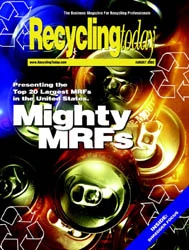AN OBJECTIVE POINT OF VIEW
You are probably inundated in your office with business-to-business magazines such as this one. They come in all shapes, sizes and colors. For a C&D recycler, the publications received might cover not only this specific marketplace, but also construction, waste handling and general recycling. Indeed, we have heard the lament that there are too many magazines out there, and not enough time to read them all.
So how do you know where to spend your time?
Obviously, it should be with the ones that actually provide useful, unbiased, non-commercial information that can help you improve your business and make smarter decisions. Sometimes that means the magazine will have to run controversial articles. One such article appears in this issue, where we take on the debate of track-mounted versus wheel-mounted crushing and screening equipment.
Many magazines shy away from providing such even-handed information in favor of running commercials dressed up as editorial. At C&D Recycler we don’t believe in that. We feel you, the recycler, should get the information you need to help expand your business. We edit this publication for the benefit of the recycler, in the hopes that you will be attracted to it, read it and peruse the advertisements.
We feel credible editorial will provide a credible setting for the advertisers, who in turn are the lifeblood of any magazine. That is why we will continue to provide unbiased, comprehensive articles such as our story on the pros and cons of mobile and portable crushing, which starts on page 28. We talked with the manufacturers of the equipment, and put their thoughts side-by-side so recyclers can compare them. We urge you to look this article over. Also, please feel free to contact us if you have any ideas on how we can better serve the C&D recycling industry.
*************
It’s no secret that Central C&D Recycling in Des Moines, Iowa, has shut its doors. The facility was closely watched as it was a state-of-art, mixed C&D recycling plant in a relatively non-urban environment. The reasons the operation didn’t make it are numerous and complex, and not really the point here. What is interesting, and what has raised the eyes of cynics, is the reaction of the local government-owned landfill after Central C&D shut down a few months ago. But first a little background.
Currently Central is trying to market its used equipment. But when it was running, it had a mixed relationship with Metro Waste Authority, the quasi-governmental agency that runs the local huge hole in the ground. Metro spouted the proper phrases about wanting to recycle, even though there was a tipping fee reduction for large-volume C&D waste generators. Metro never really supported or fought the private company recycling.
But when Central shut down, amazingly, within a few months, Metro hired the same consulting firm that helped Central get started to find it someone to run a C&D recycling plant on or near its premises. You hear all the time from the public sector about supporting public/private partnerships for recycling, and sometimes the public sector makes it work. It seems Metro, though, could not or would not work with the private sector company when it was around, but was in a big hurry to set up its own C&D recycling plant when it was gone. Perhaps Metro should have worked more closely with the existing plant when it had its chance.
Get curated news on YOUR industry.
Enter your email to receive our newsletters.
Explore the August 2002 Issue
Check out more from this issue and find your next story to read.
Latest from Recycling Today
- Athens Services terminates contract with San Marino, California
- Partners develop specialty response vehicles for LIB fires
- Sonoco cites OCC shortage for price hike in Europe
- British Steel mill’s future up in the air
- Tomra applies GAINnext AI technology to upgrade wrought aluminum scrap
- Redwood Materials partners with Isuzu Commercial Truck
- The push for more supply
- ReMA PSI Chapter adds 7 members






